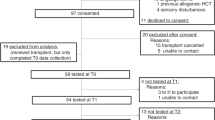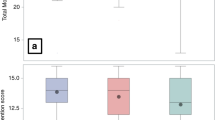Abstract
Context
Survivors of allogeneic hematopoietic stem cell transplantation (alloHCT) may experience cognitive impairment over time post-treatment, but early identification of these individuals is limited.
Objectives
We previously reported a prospective evaluation of cognitive functioning over the first 6 months of alloHCT. Here, we report an extension of this study, with specific aims to (1) evaluate the trajectory of cognitive outcomes over the first 6 years post-alloHCT, and (2) determine the extent to which late cognitive impairment is predicted by earlier impairment.
Methods
Participants completed objective and subjective cognitive measures before alloHCT, and at 100 days, 6 months, and 6 years post-alloHCT. Outcome trajectories were determined using linear mixed effects models. Relationships between early and late cognitive impairment were assessed using logistic regression and receiver operator curves.
Results
This analysis is based on longitudinal data from 59 participants, of whom 20 provided data at 6-year follow-up. Longitudinal models revealed an overall stability of cognitive outcomes over time, except for psychomotor efficiency/processing speed performance, which significantly improved (p = .049). However, poor learning/memory and cognitive complaints were persistently observed. At 6 years, 40% of relapse-free survivors met the impairment criteria. Impairment at 100 days was associated with impairment 6 years (OR = 20.00, p = .028) and demonstrated good accuracy in classifying those who were impaired and not impaired at 6 years (AUC = .79; 95% CI = .56-1.00).
Conclusion
Poor cognitive outcomes among long-term alloHCT survivors are associated with cognitive functioning during the early post-treatment period. Early identification of survivors likely to experience poor cognitive outcomes may be possible, enabling timely intervention to mitigate long-term negative impacts.



Similar content being viewed by others
References
Atilla E, Atilla PA, Toprak SK, Demirer T (2017) A review of late complications of allogeneic hematopoietic stem cell transplantations. Clin Transpl 31(10):e13062. https://doi.org/10.1111/ctr.13062
Kelly DL, Buchbinder D, Duarte RF, Auletta JJ, Bhatt N, Byrne M, DeFilipp Z, Gabriel M, Mahindra A, Norkin M, Schoemans H, Shah AJ, Ahmed I, Atsuta Y, Basak GW, Beattie S, Bhella S, Bredeson C, Bunin N, Dalal J, Daly A, Gajewski J, Gale RP, Galvin J, Hamadani M, Hayashi RJ, Adekola K, Law J, Lee CJ, Liesveld J, Malone AK, Nagler A, Naik S, Nishihori T, Parsons SK, Scherwath A, Schofield HL, Soiffer R, Szer J, Twist I, Warwick A, Wirk BM, Yi J, Battiwalla M, Flowers ME, Savani B, Shaw BE (2018) Neurocognitive dysfunction in hematopoietic cell transplant recipients: expert review from the Late Effects and Quality of Life Working Committee of the Center for International Blood and Marrow Transplant Research and Complications and Quality of Life Working Party of the European Society for Blood and Marrow Transplantation. Biol Blood Marrow Transplant 24(2):228–241. https://doi.org/10.1016/j.bbmt.2017.09.004
Syrjala KL, Artherholt SB, Kurland BF et al (2011) Prospective neurocognitive function over 5 years after allogeneic hematopoietic cell transplantation for cancer survivors compared with matched controls at 5 years. J Clin Oncol 29(17):2397–2404. https://doi.org/10.1200/jco.2010.33.9119
Sharafeldin N, Bosworth A, Patel SK, Chen Y, Morse E, Mather M, Sun C, Francisco L, Forman SJ, Wong FL, Bhatia S (2018) Cognitive functioning after hematopoietic cell transplantation for hematologic malignancy: results from a prospective longitudinal study. J Clin Oncol 36(5):463–475. https://doi.org/10.1200/jco.2017.74.2270
Mayo S, Messner HA, Rourke SB, Howell D, Victor JC, Kuruvilla J, Lipton JH, Gupta V, Kim DD, Piescic C, Breen D, Lambie A, Loach D, Michelis FV, Alam N, Uhm J, McGillis L, Metcalfe K (2016) Relationship between neurocognitive functioning and medication management ability over the first 6 months following allogeneic stem cell transplantation. Bone Marrow Transplant 51(6):841–847. https://doi.org/10.1038/bmt.2016.2
Mayo SJ, Messner HA, Rourke SB, Howell D, Victor JC, Lipton JH, Kuruvilla J, Gutpa V, Kim DDH, Michelis FV, Metcalfe K (2020 May) Predictors of the trajectory of cognitive functioning in the first 6 months after allogeneic hematopoietic stem cell transplantation. Bone Marrow Transplant 55(5):918–928. https://doi.org/10.1038/s41409-019-0746-3
Phillips KM, McGinty HL, Cessna J et al (2013) A systematic review and meta-analysis of changes in cognitive functioning in adults undergoing hematopoietic cell transplantation. Bone Marrow Transplant 48(10):1350–1357. https://doi.org/10.1038/bmt.2013.61
Syrjala KL, Dikmen S, Langer SL, Roth-Roemer S, Abrams JR (2004) Neuropsychologic changes from before transplantation to 1 year in patients receiving myeloablative allogeneic hematopoietic cell transplant. Blood 104(10):3386–3392. https://doi.org/10.1182/blood-2004-03-1155
Cysique LA, Franklin D Jr, Abramson I, Ellis RJ, Letendre S, Collier A, Clifford D, Gelman B, McArthur J, Morgello S, Simpson D, McCutchan JA, Grant I, Heaton RK, the CHARTER group, the HNRC group (2011) Normative data and validation of a regression based summary score for assessing meaningful neuropsychological change. J Clin Exp Neuropsychol 33(5):505–522. https://doi.org/10.1080/13803395.2010.535504
Przepiorka D, Weisdorf D, Martin P, Klingemann HG, Beatty P, Hows J, Thomas ED (1995) 1994 Consensus conference on acute GVHD grading. Bone Marrow Transplant 15(6):825–828
Filipovich AH, Weisdorf D, Pavletic S, Socie G, Wingard JR, Lee SJ, Martin P, Chien J, Przepiorka D, Couriel D, Cowen EW, Dinndorf P, Farrell A, Hartzman R, Henslee-Downey J, Jacobsohn D, McDonald G, Mittleman B, Rizzo JD, Robinson M, Schubert M, Schultz K, Shulman H, Turner M, Vogelsang G, Flowers MED (2005) National Institutes of Health consensus development project on criteria for clinical trials in chronic graft-versus-host disease: I. Diagnosis and staging working group report. Biol Blood Marrow Transplant 11(12):945–956. https://doi.org/10.1016/j.bbmt.2005.09.004
Wefel JS, Vardy J, Ahles T, Schagen SB (2011) International Cognition and Cancer Task Force recommendations to harmonise studies of cognitive function in patients with cancer. Lancet Oncol 12(7):703–708. https://doi.org/10.1016/S1470-2045(10)70294-1
Brandt J, Benedict RH (2001) (2001) Hopkins Verbal Learning Test-Revised, professional manual. PAR, Lutz
The Neuropsychology Center (2008) Manual for administration and scoring, Trail Making Test. The Neuropsychology Center, Plano
Wechsler D (1997) Wechsler Adult Intelligence Scale-third edition: administration and scoring manual. The Psychological Corporation, San Antonio
Wechsler D (1997) WMS-III: Wechsler Memory Scale Administration and Scoring Manual. The Psychological Corporation, San Antonio
Carey CL, Woods SP, Gonzalez R, Conover E, Marcotte TD, Grant I, Heaton RK (2004) Predictive validity of global deficit scores in detecting neuropsychological impairment in HIV infection. J Clin Exp Neuropsychol 26(3):307–319. https://doi.org/10.1080/13803390490510031
Aaronson NK, Ahmedzai S, Bergman B, Bullinger M, Cull A, Duez NJ, Filiberti A, Flechtner H, Fleishman SB, Haes JCJM, Kaasa S, Klee M, Osoba D, Razavi D, Rofe PB, Schraub S, Sneeuw K, Sullivan M, Takeda F (1993) The European Organization for Research and Treatment of Cancer QLQ-C30: a quality-of-life instrument for use in international clinical trials in oncology. J Natl Cancer Inst 85(5):365–376
Fayers P, Aaronson NK, Bjordal K et al (2001) The EORTC QLQ-C30 Scoring Manual, 3rd edn. European Organisation for Research and Treatment of Cancer, Brussels
Giesinger JM, Loth FLC, Aaronson NK, Arraras JI, Caocci G, Efficace F, Groenvold M, van Leeuwen M, Petersen MA, Ramage J, Tomaszewski KA, Young T, Holzner B, EORTC Quality of Life Group (2020) Thresholds for clinical importance were established to improve interpretation of the EORTC QLQ-C30 in clinical practice and research. J Clin Epidemiol 118:1–8. https://doi.org/10.1016/j.jclinepi.2019.10.003
Osoba D, Rodrigues G, Myles J, Zee B, Pater J (1998) Interpreting the significance of changes in health-related quality-of-life scores. J Clin Oncol 16(1):139–144
McNeish D (2017) Small sample methods for multilevel modeling: a colloquial elucidation of REML and the Kenward-Roger correction. Multivar Behav Res 52(5):661–670. https://doi.org/10.1080/00273171.2017.1344538
Treanor CJ, McMenamin UC, O'Neill RF et al (2016) Non-pharmacological interventions for cognitive impairment due to systemic cancer treatment. Cochrane Database Syst Rev (8):Cd011325. https://doi.org/10.1002/14651858.CD011325.pub2
Poppelreuter M, Weis J, Mumm A, Orth HB, Bartsch HH (2008) Rehabilitation of therapy-related cognitive deficits in patients after hematopoietic stem cell transplantation. Bone Marrow Transplant 41(1):79–90. https://doi.org/10.1038/sj.bmt.1705884
Schulz-Kindermann F, Mehnert A, Scherwath A, Schirmer L, Schleimer B, Zander AR, Koch U (2007) Cognitive function in the acute course of allogeneic hematopoietic stem cell transplantation for hematological malignancies. Bone Marrow Transplant 39(12):789–799. https://doi.org/10.1038/sj.bmt.1705663
Harder H, Duivenvoorden HJ, van Gool AR, Cornelissen JJ, van den Bent MJ (2006) Neurocognitive functions and quality of life in haematological patients receiving haematopoietic stem cell grafts: a one-year follow-up pilot study. J Clin Exp Neuropsychol 28(3):283–293. https://doi.org/10.1080/13803390490918147
Beglinger LJ, Duff K, Van Der Heiden S et al (2007) Neuropsychological and psychiatric functioning pre- and posthematopoietic stem cell transplantation in adult cancer patients: a preliminary study. J Int Neuropsychol Soc 13(1):172–177. https://doi.org/10.1017/S1355617707070208
Hong F, Bosco JLF, Bush N, Berry DL (2013) Patient self-appraisal of change and minimal clinically important difference on the European organization for the research and treatment of cancer quality of life questionnaire core 30 before and during cancer therapy. BMC Cancer 13:165
Correa DD, Root JC, Baser R, Moore D, Peck KK, Lis E, Shore TB, Thaler HT, Jakubowski A, Relkin N (2013) A prospective evaluation of changes in brain structure and cognitive functions in adult stem cell transplant recipients. Brain Imaging Behav 7(4):478–490. https://doi.org/10.1007/s11682-013-9221-8
Hutchinson AD, Hosking JR, Kichenadasse G, Mattiske JK, Wilson C (2012) Objective and subjective cognitive impairment following chemotherapy for cancer: a systematic review. Cancer Treat Rev 38(7):926–934. https://doi.org/10.1016/j.ctrv.2012.05.002
Von Ah D, Habermann B, Carpenter JS, Schneider BL (2013) Impact of perceived cognitive impairment in breast cancer survivors. Eur J Oncol Nurs 17(2):236–241. https://doi.org/10.1016/j.ejon.2012.06.002
Klaver KM, Duijts SFA, Engelhardt EG, Geusgens CAV, Aarts MJB, Ponds RWHM, van der Beek AJ, Schagen SB (2020) Cancer-related cognitive problems at work: experiences of survivors and professionals. J Cancer Surviv 14(2):168–178. https://doi.org/10.1007/s11764-019-00830-5
Lange M, Licaj I, Clarisse B, Humbert X, Grellard JM, Tron L, Joly F (2019) Cognitive complaints in cancer survivors and expectations for support: Results from a web-based survey. Cancer Med 8(5):2654–2663. https://doi.org/10.1002/cam4.2069
Vardy J, Wefel JS, Ahles T, Tannock IF, Schagen SB (2008) Cancer and cancer-therapy related cognitive dysfunction: an international perspective from the Venice cognitive workshop. Ann Oncol 19(4):623–629. https://doi.org/10.1093/annonc/mdm500
Reitan RM, Davidson LA (eds) (1974) Clinical neuropsychology: current status and applications. V.H. Winston & Sons, Washington
Acknowledgments
We acknowledge the valuable contribution of the late Dr. Hans Messner, who was instrumental in the conceptualization and design of this study.
Funding
This work was funded by the Oncology Nursing Foundation (Research Grant awarded to SJM).
Author information
Authors and Affiliations
Corresponding author
Ethics declarations
Conflict of interest
The authors declare that they have no conflict of interest.
Additional information
Publisher’s note
Springer Nature remains neutral with regard to jurisdictional claims in published maps and institutional affiliations.
Electronic supplementary material
ESM 1
(DOCX 22 kb)
Rights and permissions
About this article
Cite this article
Mayo, S.J., Wozniczka, I., Brennenstuhl, S. et al. Late cognitive outcomes among allogeneic stem cell transplant survivors: follow-up data from a 6-year longitudinal study. Support Care Cancer 29, 2621–2630 (2021). https://doi.org/10.1007/s00520-020-05761-x
Received:
Accepted:
Published:
Issue Date:
DOI: https://doi.org/10.1007/s00520-020-05761-x




